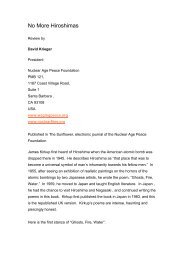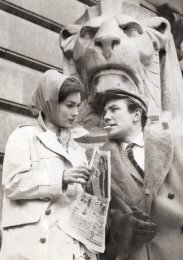Michalis Peristerakis - Spokesman Books
Michalis Peristerakis - Spokesman Books
Michalis Peristerakis - Spokesman Books
Create successful ePaper yourself
Turn your PDF publications into a flip-book with our unique Google optimized e-Paper software.
Bruce Kent, president of the International Peace Bureau, presents Mikis <strong>Peristerakis</strong><br />
with a special award for his services to the peace movement, Athens, 2003.
<strong>Michalis</strong><br />
<strong>Peristerakis</strong><br />
A last farewell<br />
Panos Trigazis<br />
Bruce Kent<br />
Colin Archer<br />
Panos Trigazis is<br />
President of the Greek<br />
Monitor of International<br />
Organizations and<br />
Globalization. For many<br />
years, he worked together<br />
with Mikis <strong>Peristerakis</strong> in<br />
support of peace and<br />
human rights.<br />
47<br />
The Marathon race of <strong>Michalis</strong><br />
<strong>Peristerakis</strong>’s life, which began in Naxos 73<br />
years ago, came to an end prematurely. An<br />
emblematic figure in the Greek peace<br />
movement, with significant international<br />
activity, for which he was officially<br />
honoured by the International Peace Bureau,<br />
Mikis – as his international friends called<br />
him – passed away suddenly on 4 May<br />
2011, in his law office, from a heart attack.<br />
Those of us who walked with him many<br />
times from Marathon for a world without<br />
wars, hunger and enviromental degradation,<br />
or who protested against the ‘Euromissiles’<br />
with Mikis in various European capitals, or<br />
who travelled with him to the opposite shore<br />
of the Aegean in support of ‘citizens’<br />
diplomacy’ and friendship between the<br />
Greek and Turkish peoples, or who coorganised<br />
events with him in solidarity with<br />
Cyprus and Palestine, or who collaborated<br />
in demonstrations against the wars in<br />
Yugoslavia, Afghanistan, Iraq and elsewhere<br />
– we all feel we have lost part of ourselves.<br />
‘Uncompromising fighter and simultaneously<br />
a deeply sensitive soul, a true<br />
fellow man,’ were the characteristic words of<br />
Professor G A Mangakis, a prominent antijunta<br />
fighter and former justice minister,<br />
describing <strong>Peristerakis</strong> during an event at the<br />
Athens Bar Association in 2006, which his<br />
friends and fellow peace activists had<br />
organised in his honour.<br />
Mikis had been in the front lines of the<br />
peace movement during difficult times. The<br />
struggle for peace was multi-dimensional in<br />
content in post-civil war Greece, but it also<br />
meant persecution and danger to the lives of<br />
its organisers, as attested by the execution<br />
of Nikiforides in 1951 and the murder of
48<br />
NATO? – No thanks!<br />
Grigoris Lambrakis in 1963.<br />
Mikis joined the peace and democracy movement very young, while a law<br />
student at the University of Athens. At the age of 24 he became president of<br />
the Bertrand Russell Youth Movement for Nuclear Disarmament. This was<br />
a movement with fresh ideas and very broad appeal during a period when the<br />
nuclear dangers were underlined dramatically by the Cuba crisis, and Greece<br />
was a ‘frontline’ state in the Cold War divide.<br />
At that time, the development of the peace movement was part of the<br />
more general upsurge of student and youth movements, with major<br />
struggles for democracy and free education for all, accompanied by the<br />
demand that 15 per cent of the state budget be devoted to this sector.<br />
A landmark was the first Marathon Peace March on 21 April 1963,<br />
which had been banned by the then government of Karamanlis. Defying<br />
the ban and mass arrests, most of the organizers, as well as international<br />
guests from CND, joined the thousands who marched. They were led by<br />
left wing MP Grigoris Lambrakis who, shortly after, became a martyr of<br />
the Greek and international peace movements when he was assassinated<br />
by fascists in Thessaloniki on 22 May 1963, following a peace rally.<br />
Subsequently, the founding of the Lambrakis Democratic Youth, on the<br />
initiative of Mikis Theodorakis, was a milestone, and the name of<br />
<strong>Peristerakis</strong> was among the 30 signatories under its founding declaration<br />
published on 9 June that year. In the following years, peace marches from<br />
Marathon to Athens were held annually with tens (even hundreds) of<br />
thousands participating.<br />
The democratic spring brought about by the ‘Greek May’ of 1963 was<br />
halted abruptly by the imposition of dictatorship on 21 April 1967, during<br />
which <strong>Peristerakis</strong> was among those who suffered the hardships inflicted<br />
by the US-supported regime on thousands of those of the left who<br />
advocated democracy and peace.<br />
After the dictatorship fell, seven years later, <strong>Peristerakis</strong> once again<br />
became active in the movement in the post of vice-president and, later,<br />
president of the Independent Peace Movement (AKE). He was in the front<br />
ranks of new Marathon marches against nuclear weapons and US military<br />
bases. He contributed to collaboration between the three main Greek peace<br />
movements, AKE-EEDYE-KEADEA, and participated actively in the<br />
European and international anti-nuclear movement, contributing<br />
especially to the establishment of European Nuclear Disarmament (END)<br />
and to peace actions across Europe against the ‘Euromissiles’, for the<br />
simultaneous dissolution of NATO and the Warsaw Pact, and the creation<br />
of a nuclear-weapon-free Europe. This movement witnessed
<strong>Michalis</strong> <strong>Peristerakis</strong><br />
49<br />
unprecedented growth, contributing decisively to the historic intermediate<br />
nuclear forces (INF) agreement, between Reagan and Gorbachev in 1987,<br />
which led to the abolition of medium-range missiles.<br />
Mikis worked closely with the Bertrand Russell Peace Foundation, the<br />
International Peace Bureau, and other peace organisations, collaborating<br />
with prominent peace activists such as Ken Coates, Bruce Kent, Luciana<br />
Castellina and others.<br />
In addition, he maintained warm relations with the Japanese peace<br />
movement, especially with Gensuikyo and Hidankyo, and invited groups<br />
of Hibakusha (atomic bomb survivors) to Greece and also welcomed the<br />
‘Peace Boat’ from Japan.<br />
Even after the end of the Cold War, Mikis continued his activity in the<br />
front ranks of the anti-war movement, sparked by wars in the Gulf,<br />
Yugoslavia, Afghanistan, Iraq, Lebanon and the Gaza Strip. He also said<br />
‘No’ to the war on Libya which was getting under way.<br />
The last time we met was shortly before his death, at a meeting in the<br />
Technical Chamber of Greece about organising a new anti-nuclear<br />
movement as a result of the recent great tragedy at Fukushima. He<br />
declared his support with enthusiasm, as always.<br />
* * *<br />
Bruce Kent, past president of the International Peace Bureau, sent this<br />
short appreciation.<br />
Mikis was a really bright star in the peace world. We met especially in the<br />
1980s and 90s at International Peace Bureau committee meetings and other<br />
rallies. His great strength was enthusiasm. He would burst into meetings<br />
with new ideas (not always on the agenda) and the conviction that they<br />
could be made to happen. And he helped to make them happen. In later<br />
years I would get, out of the blue, sudden messages of encouragement and<br />
hope. His interest was never in promoting himself – but always in<br />
opportunites to build a better, fairer and more peaceful world.<br />
Colin Archer, current secretary-general of the International Peace<br />
Bureau, added these comments.<br />
During Mikis’s long involvement with the International Peace Bureau there<br />
were two special highlights. In 1992, he organised a large-scale banquet in<br />
Athens in honour of IPB’s centenary, to which many distinguished people<br />
were invited. In 2003, he helped convene a Greek Organising Committee to<br />
put together the programme for a unique conference which was held in both
50<br />
NATO? – No thanks!<br />
Athens University and at the original site at Olympia, in the run-up to the<br />
2004 Athens Olympics. The conference focused in part on the ancient<br />
Olympic Truce, now being revived for the modern age. At this conference<br />
Mikis was awarded a special IPB prize (see photo).<br />
A good account of earlier, turbulent events , including Mikis’s own role<br />
in the Greek struggle, can be found in Larry Wittner’s Resisting the Bomb<br />
(volume two of his three volume History of the World Nuclear<br />
Disarmament Movement, Stanford, 1997, pp 238-240). Mikis is also<br />
briefly portrayed in the classic film ‘Z’, directed by Costa-Gavras, which<br />
informed the world about the assassination of Lambrakis.<br />
Mikis recently sent this message to the Mayors of Hiroshima and Nagasaki:<br />
‘We pray the catastrophe to stop now, and the people of Japan to get the<br />
courage to rebuild their important country, and peace, joy, life and creation to<br />
return again among the Japanese people.’<br />
Ann Kestenbaum<br />
1946 - 2011<br />
Ann already worked at the Russell Foundation when I started in<br />
1980. She and I collaborated on <strong>Spokesman</strong>’s publishing<br />
programme. The appeal for European Nuclear Disarmament was<br />
under active discussion between Ken Coates, Edward Thompson,<br />
and others, and the subsequent campaign for a nuclear-weaponsfree<br />
Europe was to change our lives. Ann became very active in<br />
Nottingham for Nuclear Disarmament, and gave that collective a<br />
strong internationalist direction. Her American husband, Al,<br />
reinforced this tendency. We thus found ourselves organising a<br />
coach-load of activists to attend the second END Convention in<br />
Berlin, in 1983. Every seat on the bus was booked. When we<br />
stopped in London to pick up some more passengers, two of them<br />
had brought huge bicycles, which they wanted to ride around<br />
Berlin. George, our stalwart driver, almost flipped. But we found<br />
the space and, in due course, the intermediate nuclear forces<br />
treaty saw off at least some of the nukes that were stashed across<br />
Europe. Ann could be seen jiving the night away as we took the<br />
ferry across the Channel on the journey home. She was fun to<br />
work with, and had loads of patience when confronted with<br />
exasperating situations. We shall all miss her.<br />
Tony Simpson






